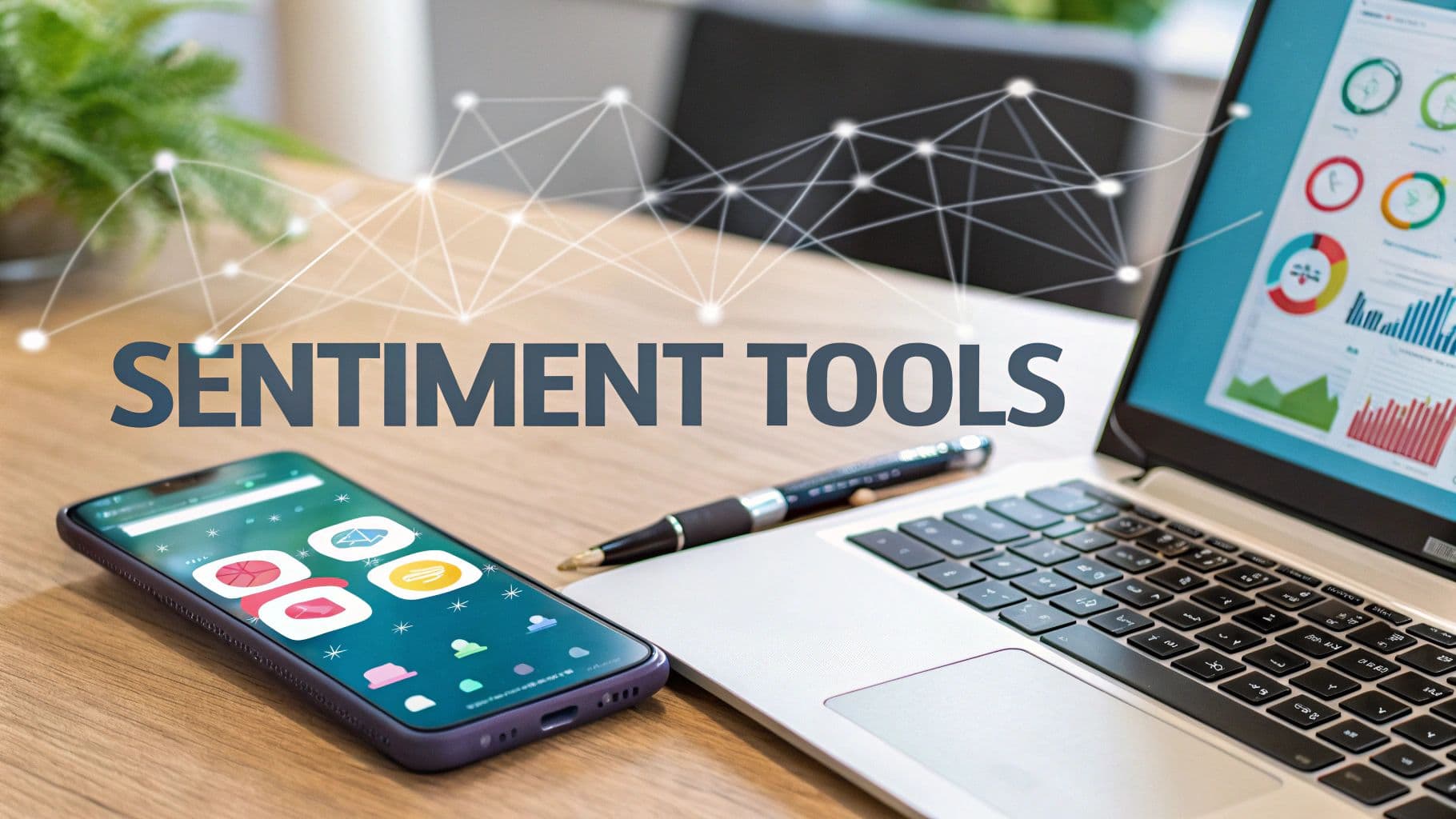
As founders, we're obsessed with what people say about our product. But manually sifting through Reddit, Twitter, and forums is a soul-crushing time sink. The signal-to-noise ratio is terrible. That's why we built our own tool, BillyBuzz. We needed to cut through the fluff and find the conversations that actually matter—the bug reports, the feature requests, the competitor comparisons, and the "I'm looking for a tool that does X" posts.
This isn't another generic list. This is a practitioner's guide to the top social media sentiment analysis tools, written from a founder-to-founder perspective. We'll show you exactly how we use these tools internally, including the specific filters, subreddits, and alert rules we've set up to find actionable feedback and leads.
For each platform, you'll get a no-BS take on its strengths, weaknesses, and who it's actually for. If you need a refresher on the basics, check out this ultimate guide to social media sentiment analysis. Our goal is to give you a practical playbook to help you pick the right tool, set it up in a day, and start hearing what your market is really saying.
1. BillyBuzz
We built BillyBuzz because every other tool gave us too much noise. Its entire purpose is to find high-intent conversations on Reddit, making it a laser-focused choice among social media sentiment analysis tools. It uses a context-aware AI to filter out 99% of the irrelevant chatter and surface posts where users are actively looking for a solution you provide. It turns Reddit from a time sink into a reliable channel for leads and feedback.
Internally, our setup is simple but powerful. We monitor a handful of key subreddits: r/saas, r/growmybusiness, r/marketing, and a few niche ones like r/productmanagement. Our alert rules are strict. For example, a core alert is: ("looking for" OR "alternative to" OR "recommendation") AND ("crm" OR "customer support tool") NOT ("free" OR "internship"). This boolean logic ensures the alerts we get in Slack are from people with genuine purchase intent.
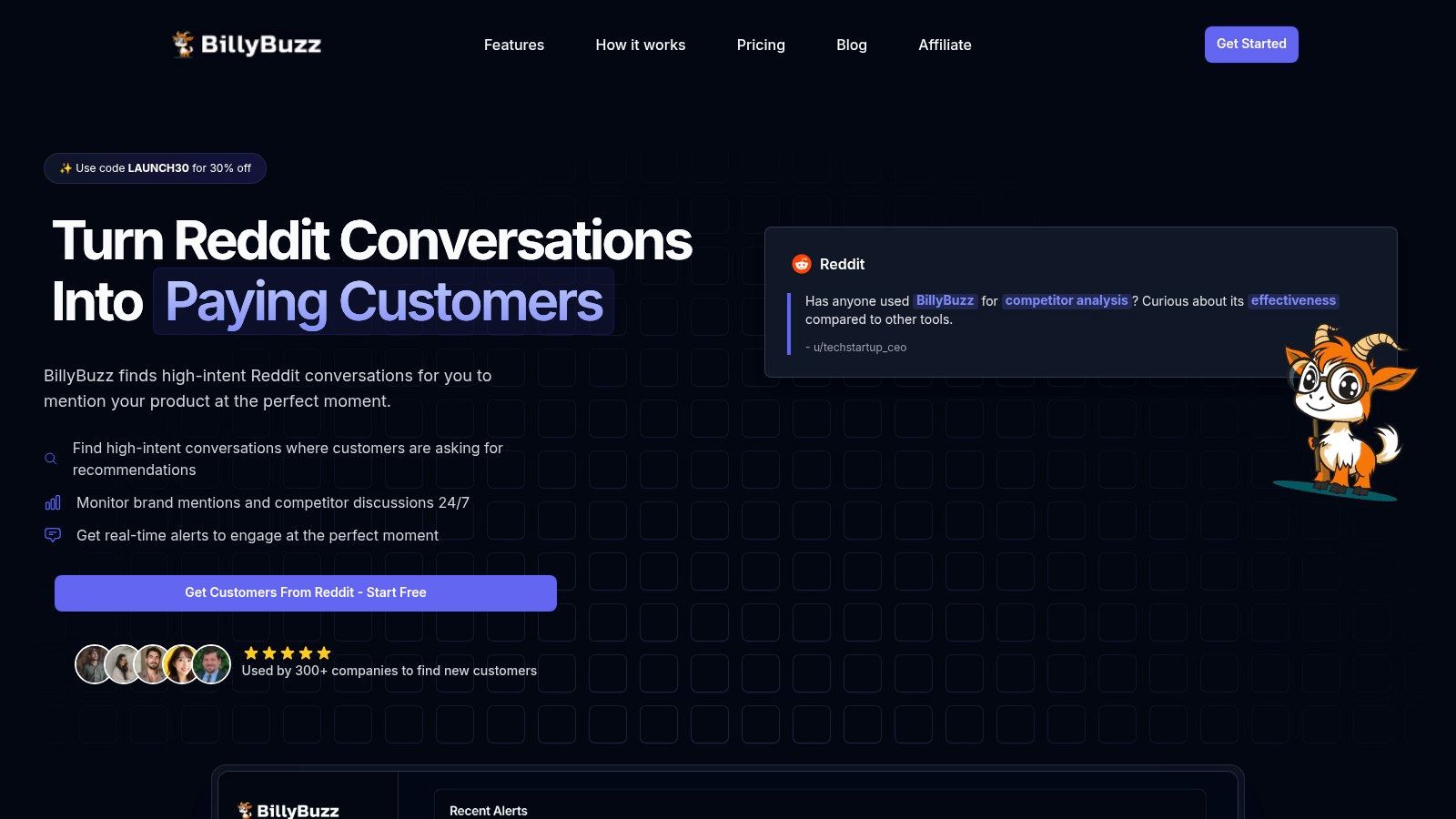
Key Features & Use Cases
- AI-Powered Relevancy Scoring: This is the core. It scores conversations for buying intent, so your sales team only jumps into discussions where a user is close to a decision. It saves us hours every single day.
- Real-Time, Multi-Channel Alerts: We pipe all high-intent mentions into a dedicated
#reddit-leadschannel in Slack. When an alert hits, the team can jump on it instantly. This is non-negotiable for us. - Organic SEO & Authority Building: We don't just sell. We answer questions authentically. These helpful replies on Reddit often rank on Google, driving long-term organic traffic and positioning us as experts.
- Founder-to-Founder Insights: Our response templates are built on empathy. We start with, "I struggled with this same problem when we were scaling. We ended up building a simple framework that worked..." This builds trust before we ever mention our product.
Pricing & Platform Details
| Plan | Price (Billed Annually) | Best For |
|---|---|---|
| Starter | $19/month | Solo founders and early-stage startups |
| Scale | $99/month | Growing marketing and sales teams |
- Pros: The focus on Reddit buying intent is unmatched. It saves an insane amount of time. The simple pricing and instant Slack alerts make it incredibly actionable for small teams.
- Cons: It's built for Reddit. If you need a comprehensive, multi-channel listening strategy, you'll need to pair it with another tool.
Website: https://www.billybuzz.com
2. Brandwatch
Brandwatch is the enterprise-grade beast. It's one of the most powerful social media sentiment analysis tools you can buy, ingesting billions of conversations to give you a macro view of your market. This isn't for finding individual leads; it's for understanding large-scale trends. Its NLP is incredibly sophisticated, letting you see not just what people are saying, but the nuanced context behind their sentiment.
This is a tool for established teams with dedicated analysts. When we used Brandwatch, we set up complex alerts that triggered only when negative sentiment around a specific product feature (e.g., "dashboard loading speed") spiked by more than 20% in a 24-hour period while also mentioning a key competitor. This gives the product team a critical early warning. Its image analysis is also powerful for seeing where your brand appears in photos without being tagged.
| Feature Analysis | Assessment |
|---|---|
| Data Coverage | Excellent: Massive library of social, blog, and forum data. |
| Sentiment Engine | Advanced: Top-tier NLP with accurate positive, negative, and neutral classifications. |
| Customization | High: Dashboards and alerts are extremely flexible, but require expertise to set up. |
| User Interface | Complex: Very powerful, but has a steep learning curve. Not for beginners. |
Pros & Cons
- Pro: Incredible data depth for discovering nuanced market insights.
- Pro: Powerful reporting tools for sharing findings with leadership or investors.
- Con: Pricing isn't public, which means it's expensive. Expect a significant investment.
- Con: It's overkill for most startups and solo founders. Too complex for simple needs.
Website: https://www.brandwatch.com/products/consumer-research/
3. Talkwalker
Talkwalker is another enterprise-level player, but its strength is in real-time crisis detection and campaign monitoring, making it one of the most responsive social media sentiment analysis tools. It excels at multi-language sentiment and visual listening (finding your brand in images/videos). We found its ability to map trend virality—showing how a single negative comment can spread across networks—to be particularly insightful for PR.
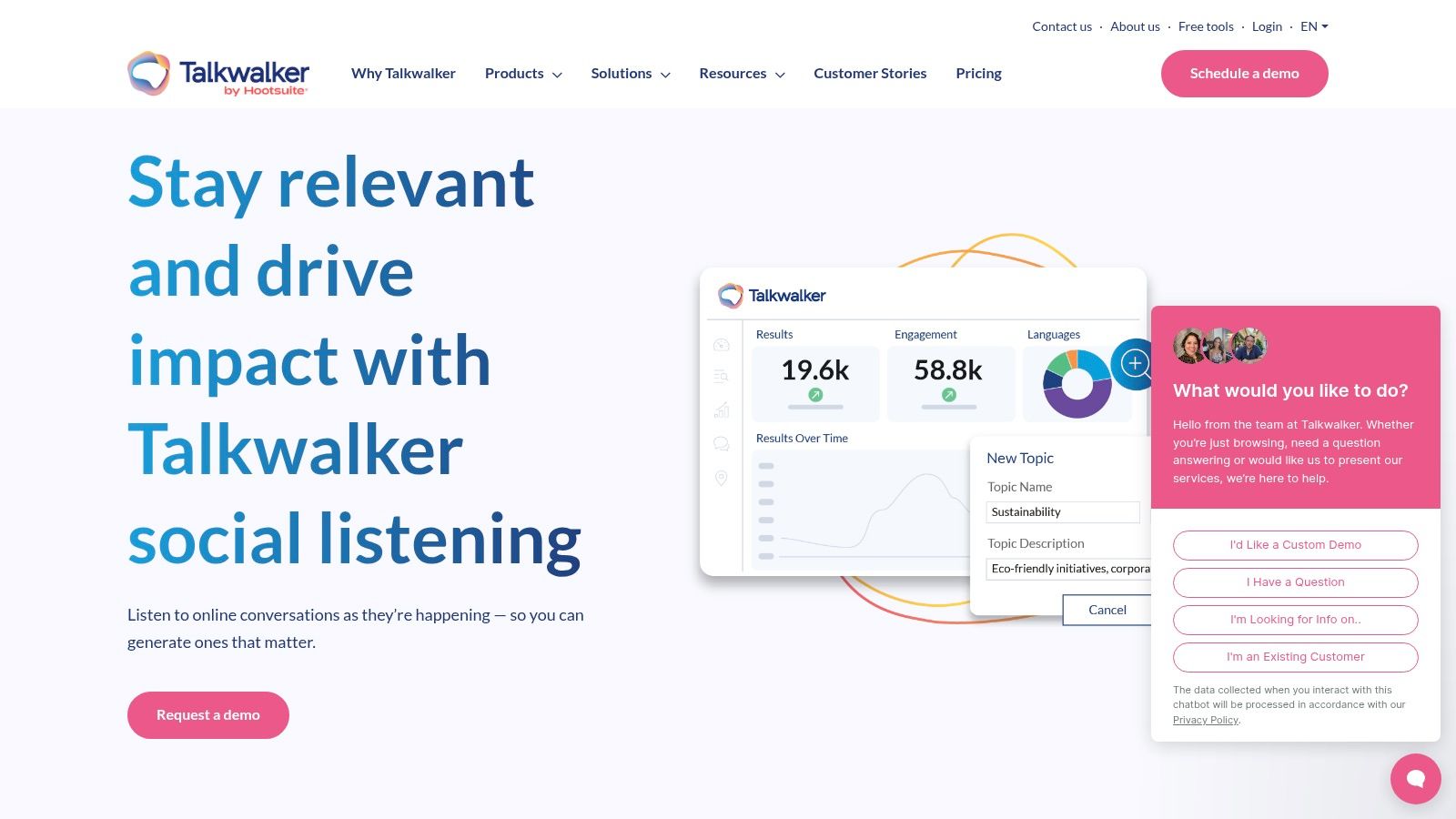
This is a tool for global brands. Our primary use for Talkwalker was setting up real-time alerts for negative sentiment spikes. The goal was to have our support team intervene before a customer complaint went viral. Its AI assistant is surprisingly useful for generating quick summaries of why sentiment is shifting, saving our marketing team from having to read through hundreds of mentions manually.
| Feature Analysis | Assessment |
|---|---|
| Data Coverage | Excellent: Monitors 30+ social networks and over 150M websites, blogs, and forums. |
| Sentiment Engine | Advanced: Strong multi-language support and AI-driven insights with visual analysis. |
| Customization | High: Flexible dashboards and real-time alerts for very specific use cases. |
| User Interface | Complex: Powerful and feature-rich, but can be overwhelming for new users. |
Pros & Cons
- Pro: Huge data coverage with excellent visual and multi-language analysis.
- Pro: Best-in-class for crisis detection and tracking how trends spread online.
- Con: Opaque enterprise pricing. It's a high-tier investment.
- Con: The sheer number of features is overkill for smaller teams or solo founders.
Website: https://www.talkwalker.com/products/social-listening
4. Sprout Social
Sprout Social is an all-in-one social media management platform that has solid listening and sentiment analysis built-in. Its strength as one of the best social media sentiment analysis tools comes from its practicality. It combines publishing, engagement, and analysis in one place, making it a great choice for teams who want an integrated workflow without buying multiple specialized tools.
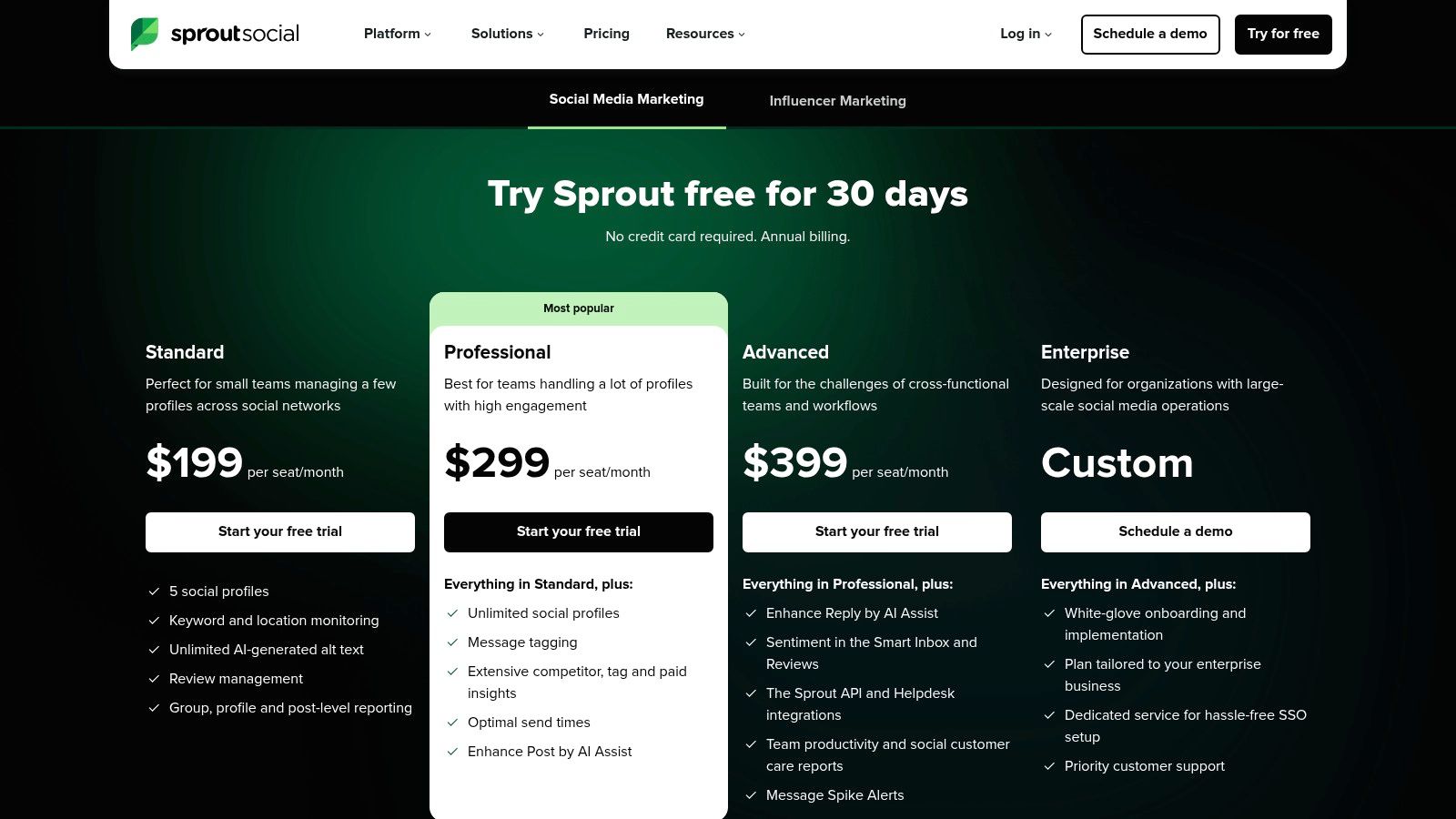
This tool is for teams that want to act on sentiment data immediately. We used Sprout’s Listening feature to track our key product features. When the tool flagged a spike in negative comments about our onboarding flow, it triggered an alert. Our support team could then jump directly into the conversation from the same platform. The ability to manually re-tag sentiment on individual posts also helps train the AI to be more accurate for your specific brand over time.
| Feature Analysis | Assessment |
|---|---|
| Data Coverage | Good: Focuses on the major social networks (Twitter, Facebook, Instagram, LinkedIn). |
| Sentiment Engine | Strong: AI-driven with the useful option to manually retag sentiment for better accuracy. |
| Customization | Moderate: Good filtering and topic setup, but not as granular as the enterprise-only tools. |
| User Interface | Excellent: Clean, intuitive, and very easy to use. Great for fast onboarding. |
Pros & Cons
- Pro: Transparent pricing and a 30-day free trial make it easy to try.
- Pro: All-in-one platform is efficient for teams that handle everything from posting to support.
- Con: The really good sentiment and listening features are only in the more expensive plans.
- Con: The per-user pricing can get expensive quickly as your team grows.
Website: https://sproutsocial.com/pricing/
5. Hootsuite (with Insights powered by Brandwatch)
Hootsuite is famous for social media scheduling, but it has become a capable social media sentiment analysis tool, especially with its Insights add-on (powered by Brandwatch). The standard plans offer basic sentiment tracking, which is fine for day-to-day monitoring. The real power is when you add on Insights, which gives you access to enterprise-grade listening data within the familiar Hootsuite interface.
This is for teams that are already living in Hootsuite and want to upgrade their analytics. We used the core sentiment features for daily brand health checks. For our quarterly planning, we used the Insights add-on to analyze sentiment trends around key industry topics, which helped shape our content calendar. This setup lets you go from insight to action (scheduling a post) without ever leaving the platform. For more on this, see our guide on AI-powered social media alerts for real-time monitoring.
| Feature Analysis | Assessment |
|---|---|
| Data Coverage | Good to Excellent: Standard coverage on core plans; access to Brandwatch's massive data with the Insights add-on. |
| Sentiment Engine | Good: Standard analysis is solid; becomes much more advanced with the Brandwatch-powered Insights. |
| Customization | Moderate: Good dashboard and stream setup, but less flexible than standalone enterprise tools. |
| User Interface | Excellent: Very user-friendly and intuitive, one of the easiest platforms to learn. |
Pros & Cons
- Pro: Combines top-tier social media management with powerful sentiment analysis in one platform.
- Pro: Extremely intuitive interface makes it easy for teams to adopt quickly.
- Con: The most advanced sentiment analysis (Insights) is a very expensive add-on.
- Con: Can get pricey as your team grows and you add more advanced features.
Website: https://www.hootsuite.com/plans
6. Sprinklr
Sprinklr is an absolute monster of a platform, designed for huge enterprises that need a unified view of the entire customer journey. As a social media sentiment analysis tool, its main advantage is its library of 70+ AI models trained for specific industries (like finance, healthcare, retail). This means its sentiment analysis is much more contextually aware and accurate for those verticals compared to general-purpose tools.
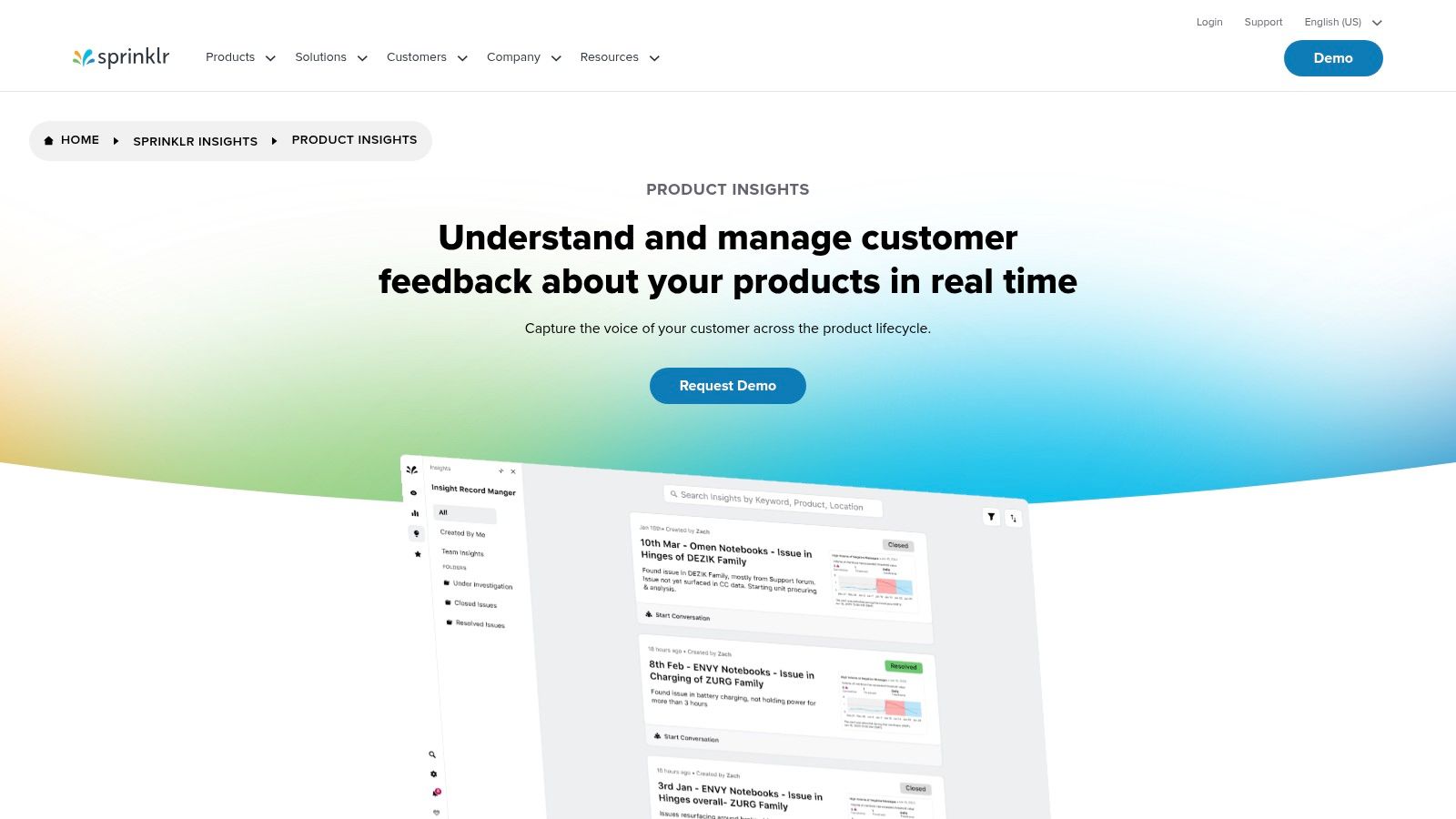
This is for global teams that need advanced automation and crisis management. We've seen Fortune 500 companies use Sprinklr to create automated alerts that flag potential PR crises based on a sudden spike in negative sentiment from high-reach influencers. Its ability to pull in data from over 900 e-commerce review sites is also a game-changer for product teams trying to consolidate feedback from dozens of sources into one dashboard.
| Feature Analysis | Assessment |
|---|---|
| Data Coverage | Excellent: Covers 30+ social networks, forums, blogs, and 900+ e-commerce review sites. |
| Sentiment Engine | Advanced: Uses 70+ vertical-specific AI models for highly accurate, context-aware analysis. |
| Customization | High: Dashboards, workflows, and alerts are extremely configurable for complex enterprise needs. |
| User Interface | Complex: Incredibly powerful but requires significant training and a dedicated team to manage. |
Pros & Cons
- Pro: The vertical-specific AI provides unmatched depth and accuracy for certain industries.
- Pro: Powerful crisis management and product feedback workflows are built directly into the platform.
- Con: Pricing is enterprise-level and completely custom. It's not for small or even mid-sized teams.
- Con: No self-serve trial. Expect a lengthy sales and onboarding process.
Website: https://www.sprinklr.com/products/consumer-intelligence/product-insights/
7. Meltwater
Meltwater is an all-in-one media intelligence platform that's a favorite among PR and comms teams. Its strength as a social media sentiment analysis tool is that it combines social listening with traditional media monitoring (online news, press releases). This gives you a single view of your brand’s perception across both user-generated content and professional media outlets.
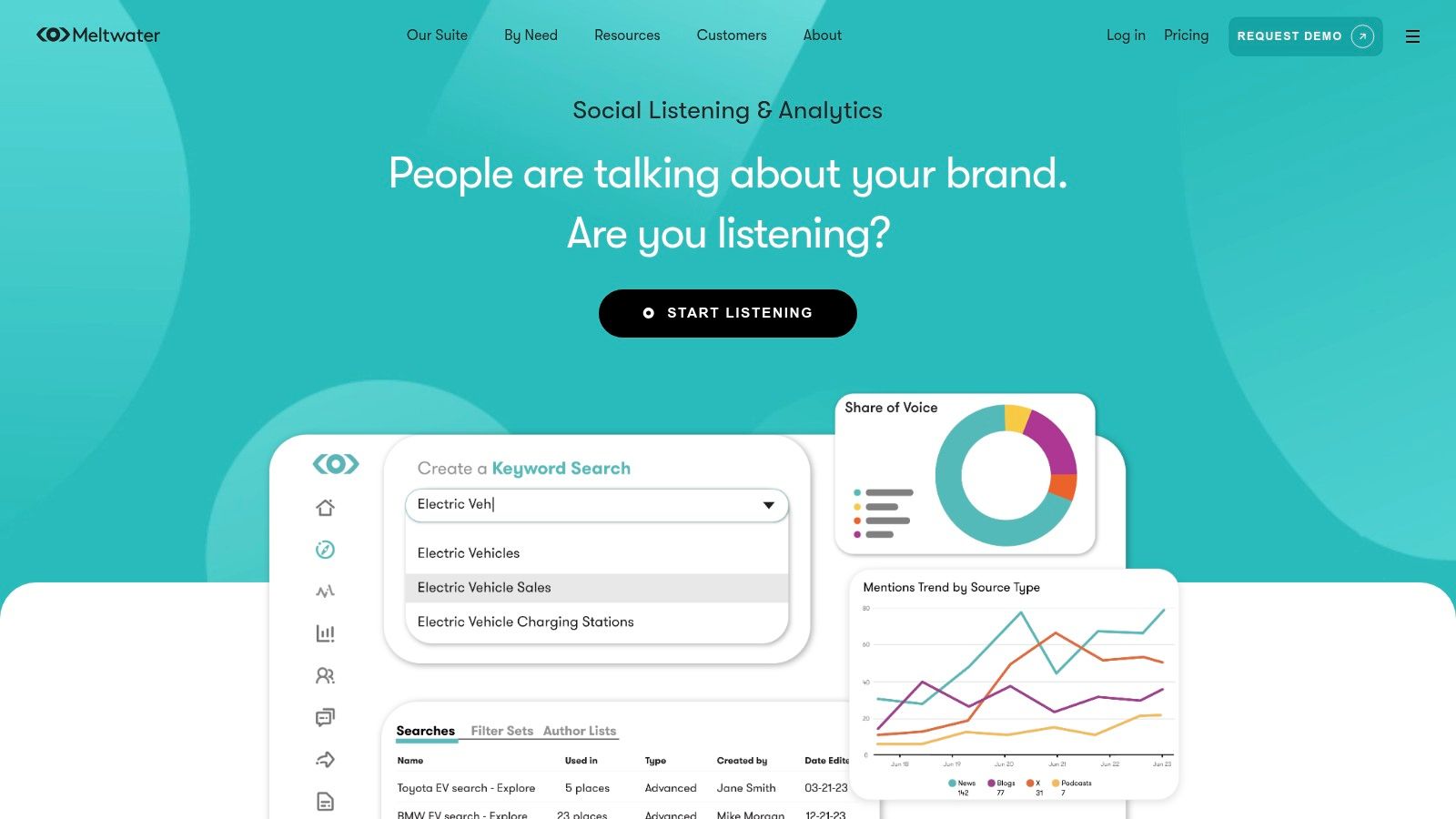
This tool is for larger organizations that need to manage brand reputation and communications at scale. We use Meltwater's real-time alerts to monitor for sudden spikes in negative sentiment tied to our brand name in major news outlets or high-traffic blogs. This is a key part of our crisis readiness plan. Its automated reporting is also a huge time-saver, sending executive-level summaries of media coverage and social sentiment directly to stakeholders each morning.
| Feature Analysis | Assessment |
|---|---|
| Data Coverage | Excellent: Blends social media data with extensive online news and media monitoring. |
| Sentiment Engine | Strong: AI-driven analysis provides reliable sentiment scoring for high-level tracking. |
| Customization | Moderate: Offers powerful dashboards and reports, but is less granular than Brandwatch. |
| User Interface | Accessible: The platform is fairly intuitive, designed for comms pros, not just data analysts. |
Pros & Cons
- Pro: Excellent for PR teams who need both social and traditional media context in one place.
- Pro: Great enterprise-level support and onboarding for large-scale deployments.
- Con: Pricing is not public and usually requires an annual contract. It's a significant investment.
- Con: Its focus is broader than just social, which might be overly complex for a pure-play marketing team.
Website: https://www.meltwater.com/en/suite/social-listening-analytics
8. Brand24
Brand24 is one of the most accessible and practical social media sentiment analysis tools for small-to-midsize businesses. It does the basics really well: real-time mention tracking with straightforward positive, negative, or neutral sentiment. Its killer feature is its "storm alerts," which notify you of a sudden, unusual spike in conversation volume, helping you get ahead of a viral story (good or bad).
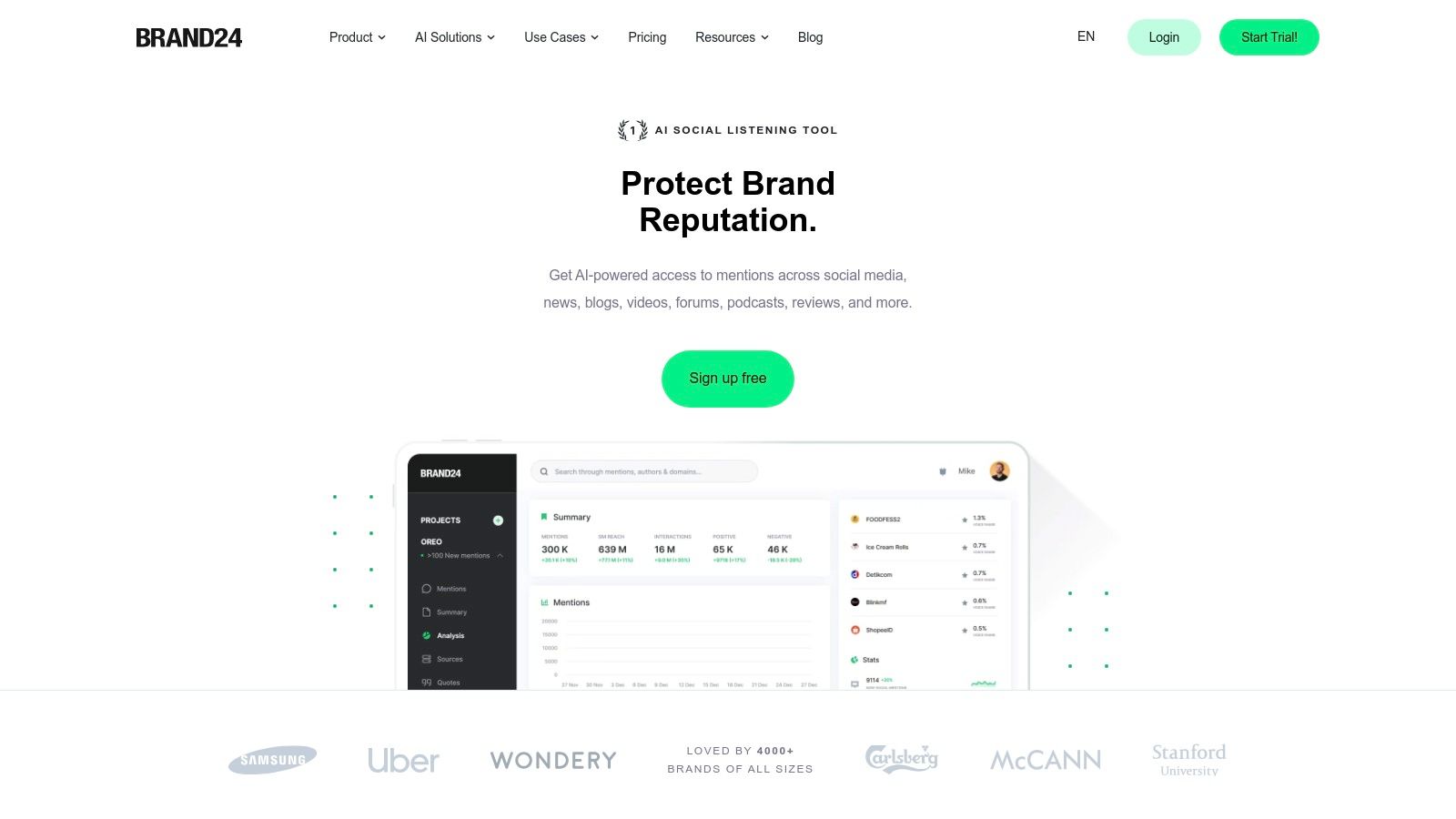
This tool is perfect for teams that need actionable alerts without enterprise complexity. We have Brand24's Slack integration pipe all negative mentions of our brand directly into a #customer-feedback channel. This gives our support and product teams instant visibility to jump on issues. Its transparent pricing and free trial make it a no-brainer to test out.
| Feature Analysis | Assessment |
|---|---|
| Data Coverage | Good: Solid coverage of major social networks, blogs, and news sites. |
| Sentiment Engine | Standard: Effective for basic positive, negative, and neutral analysis. |
| Customization | Moderate: Good reporting and alert customization, with white-labeling on higher tiers. |
| User Interface | User-Friendly: Clean, intuitive, and very easy to get started with. |
Pros & Cons
- Pro: Transparent and affordable pricing with a 14-day free trial.
- Pro: The real-time alerting system ("storm alerts") is great for reacting quickly.
- Con: Lacks the deep NLP and granular data filtering of enterprise-grade platforms.
- Con: Advanced features like API access are locked behind the most expensive plans.
Website: https://brand24.com/
9. Mention
Mention is a user-friendly listening platform that's a great choice among social media sentiment analysis tools for SMBs. Its standout feature is an "Emotion Analysis" layer that goes beyond positive/negative to detect nuanced feelings like joy, sadness, and anger. This is incredibly useful for understanding the real reaction to a new feature launch or marketing campaign.
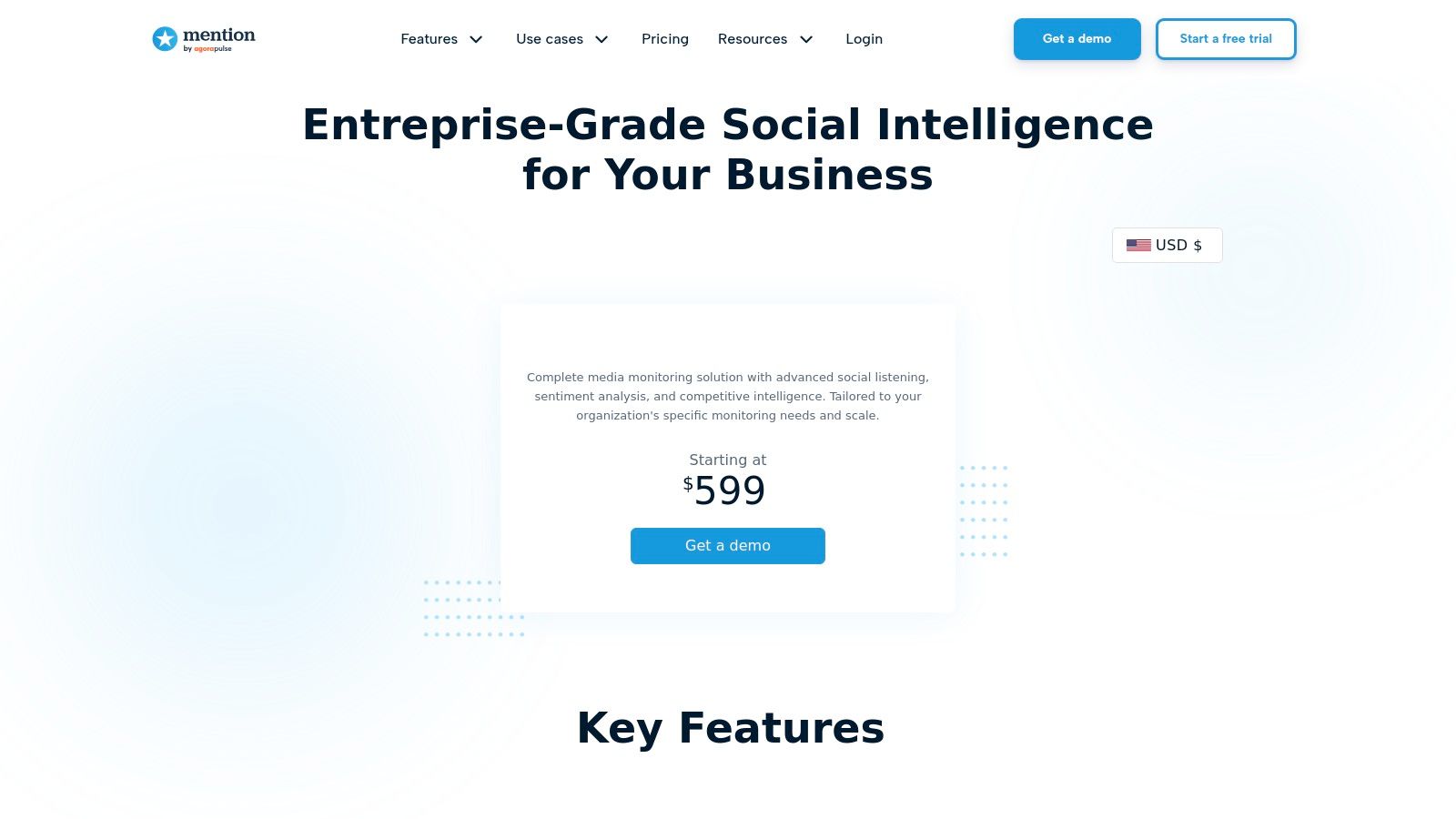
The platform is built for speed and ease of use. Our community managers use Mention’s Boolean alerts to monitor specific subreddits for our brand name combined with negative emotion keywords like "frustrated" OR "disappointed" OR "confused". This setup triggers an urgent alert, so our team can jump in and help a user before they churn. Its clean interface makes it easy to quickly compare our brand health against competitors.
| Feature Analysis | Assessment |
|---|---|
| Data Coverage | Good: Strong coverage across major social platforms, forums, and news sites. |
| Sentiment Engine | Advanced: Features an emotion analysis layer for deeper insights beyond just positive/negative. |
| Customization | Moderate: Good flexibility with alerts and reporting, though less than enterprise tools. |
| User Interface | Excellent: Clean, intuitive, and very easy for new users to get started. |
Pros & Cons
- Pro: Very user-friendly, you can get it set up and find value in under an hour.
- Pro: Emotion analysis provides a more granular and insightful view of audience sentiment.
- Con: The plans with team features can get pricey compared to other tools aimed at small businesses.
- Con: Lacks the deep historical data archives of the enterprise-grade platforms.
Website: https://mention.com/en/pricing/
10. Awario
Awario is one of the most accessible and cost-effective social media sentiment analysis tools out there. It’s a fantastic entry point for startups and small businesses. It offers solid social listening and sentiment tracking without the enterprise price tag. Its key advantage is the generous monthly mention limit on its plans, which lets you monitor conversations at scale without breaking the bank.
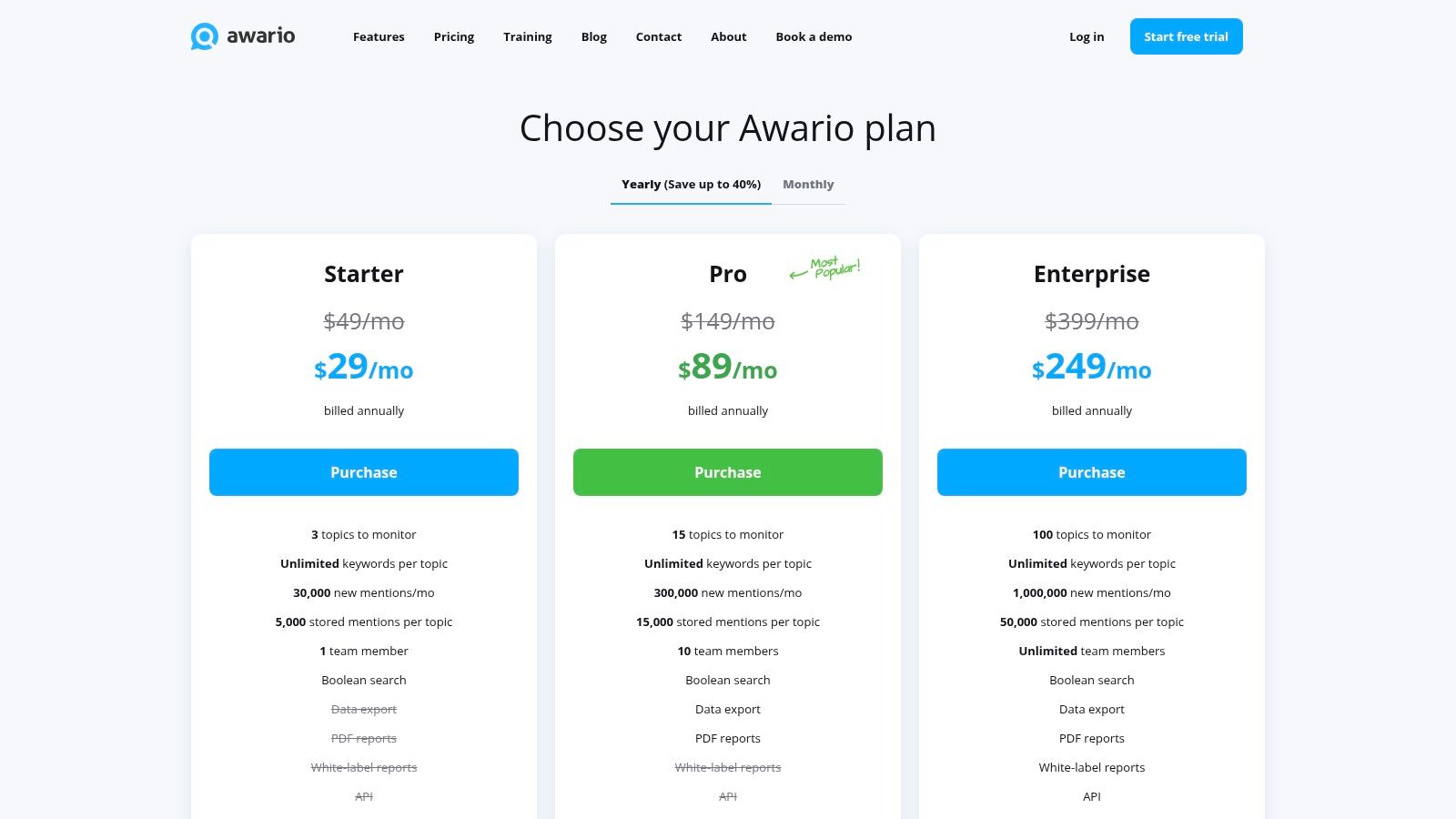
This is the tool for teams that need straightforward data without a big learning curve. We often recommend Awario to fellow founders for its simple Boolean search setup. It's great for tracking your brand, your top two competitors, and a few key industry terms. The ability to easily export data to a CSV or generate a white-label PDF report is a huge plus for sharing findings with your team or investors.
| Feature Analysis | Assessment |
|---|---|
| Data Coverage | Good: Covers major social networks, news, blogs, and forums. |
| Sentiment Engine | Standard: Provides reliable positive, negative, and neutral sentiment classifications. |
| Customization | Medium: Flexible Boolean queries and reporting, but less dashboard customization. |
| User Interface | User-Friendly: Clean, intuitive, and very easy to set up and use. |
Pros & Cons
- Pro: Very competitive pricing with a free trial. Great value for the money.
- Pro: Simple setup and user-friendly interface mean you can get started in minutes.
- Con: Lacks the deep analytical depth and advanced NLP of the more expensive platforms.
- Con: Mention limits are per alert, which can be tricky to manage if you have many alerts.
Website: https://awario.com/pricing/
11. Keyhole
Keyhole is built for real-time campaign and influencer tracking. This makes it one of the most agile social media sentiment analysis tools for live events, product launches, and hashtag monitoring. Its strength is presenting data in clean, visually intuitive dashboards that make complex metrics easy to understand at a glance. It’s for marketers who need to know "How is this campaign performing right now?"
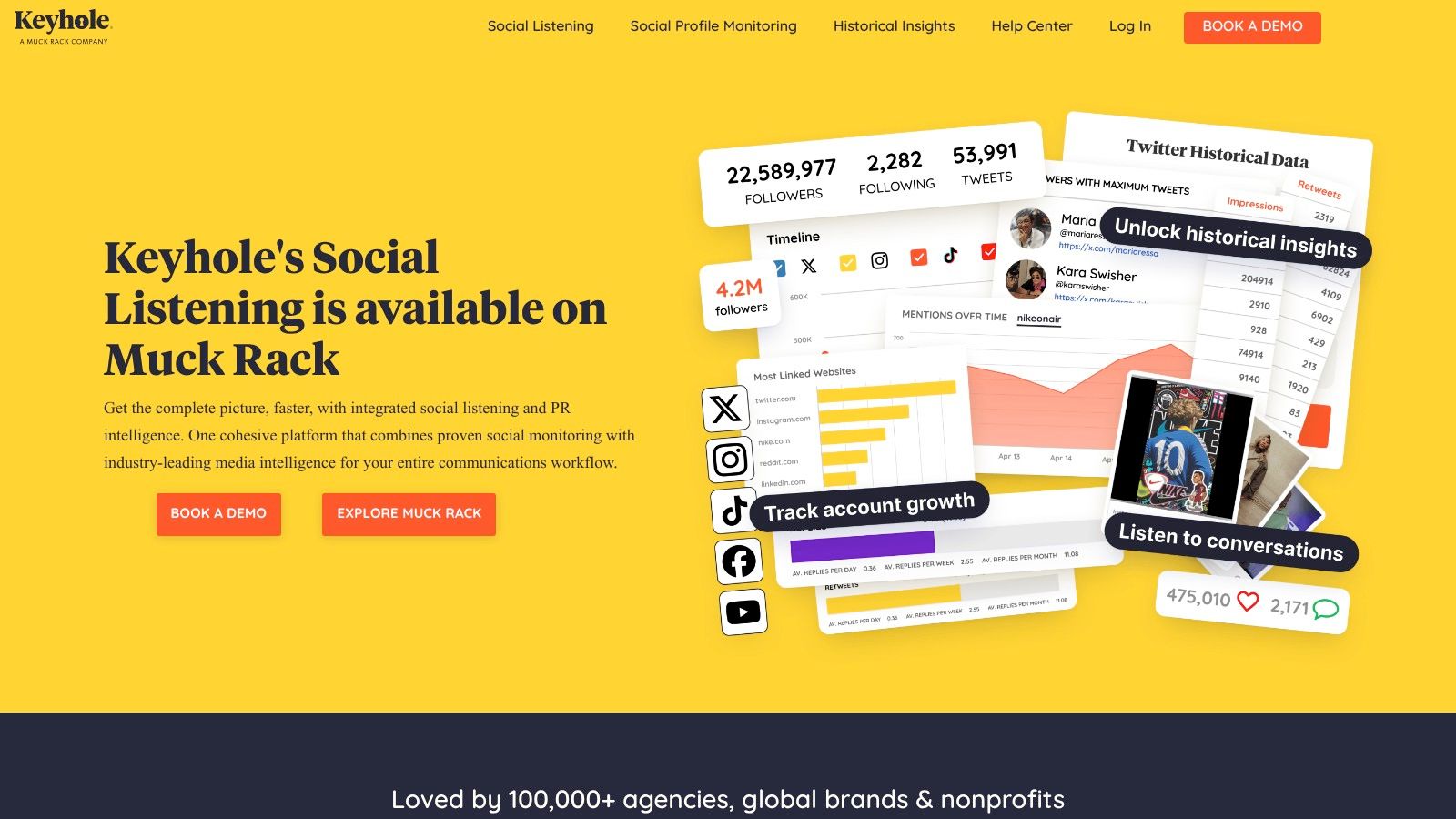
This is the tool for measuring campaign performance and influencer ROI. We use Keyhole during our launch weeks to monitor our campaign hashtags in real-time. The sentiment trendline on the dashboard tells us instantly if the reception is positive or if we need to address a growing negative conversation. It's also great for tracking influencer posts and their audience sentiment, giving you clear data on whether a partnership is actually working.
| Feature Analysis | Assessment |
|---|---|
| Data Coverage | Good: Strong focus on major social networks, especially X (Twitter) and Instagram. |
| Sentiment Engine | Standard: Provides reliable positive, negative, and neutral classifications for real-time tracking. |
| Customization | Moderate: Dashboards are well-designed but offer less granular control than enterprise suites. |
| User Interface | Excellent: Clean, modern, and designed for quick visual insights. |
Pros & Cons
- Pro: Fantastic for live event and campaign tracking with beautiful, shareable dashboards.
- Pro: Often has a lower starting price than the big, comprehensive enterprise suites.
- Con: Less depth in historical data analysis compared to other platforms.
- Con: Pricing isn't always transparent and may require a demo for a custom quote.
Website: https://keyhole.co/
12. YouScan
YouScan’s superpower is its visual analytics. It’s one of the few social media sentiment analysis tools that has powerful image recognition built-in. This lets you find your brand’s logo, products, or even specific scenes in user photos, even if you aren't tagged. Its AI assistant, "Insights Copilot," also uses ChatGPT to quickly summarize trends and sentiment drivers, which is a huge time-saver.
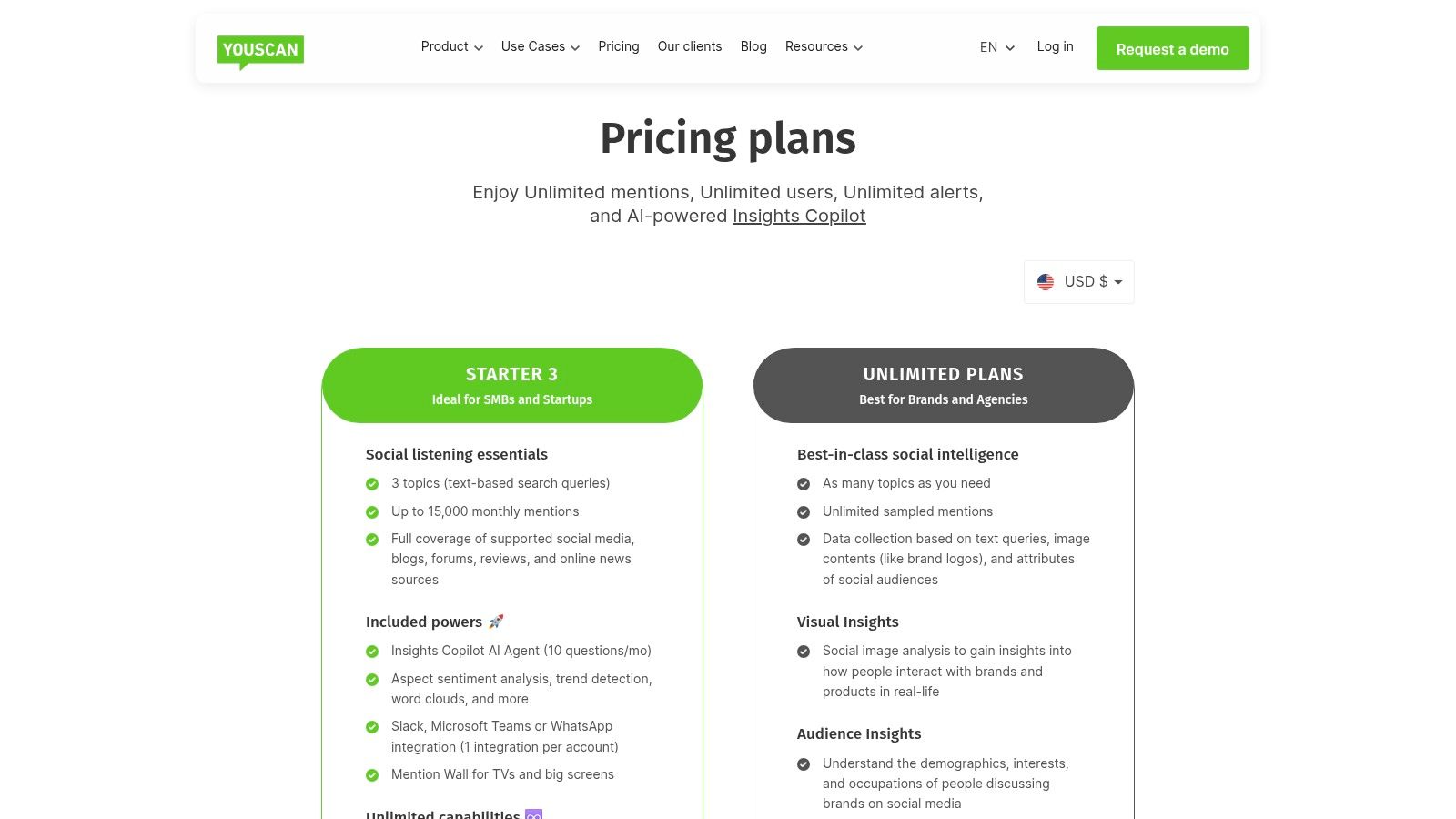
This tool is perfect for consumer brands that need to understand the full context of their online presence. We use YouScan's Visual Insights to see how customers are using our product in the real world. This often uncovers use cases we never even thought of. A huge plus is that its entry-level plan includes unlimited user seats, which is great for giving your whole team access to consumer feedback without driving up costs.
| Feature Analysis | Assessment |
|---|---|
| Data Coverage | Good: Strong on major social networks, with a focus on visual content. |
| Sentiment Engine | Advanced: AI-powered, with aspect-level sentiment and a helpful Insights Copilot. |
| Customization | Moderate: Good dashboard and alert options, with powerful rules for automation. |
| User Interface | Intuitive: Clean and easy to navigate, with a focus on data visualization. |
Pros & Cons
- Pro: Excellent visual listening (logo and object recognition) provides unique insights.
- Pro: Unlimited user seats on the starter plan is a fantastic value for growing teams.
- Con: The starter plan has mention limits, so high-volume brands will need to upgrade.
- Con: Data for some features is based on sampling, not the full dataset.
Website: https://youscan.io/pricing/
Top 12 Social Media Sentiment Analysis Tools Comparison
| Tool | Core Features | User Experience | Value Proposition | Target Audience | Price Points |
|---|---|---|---|---|---|
| BillyBuzz | AI relevancy scoring, real-time alerts (Email, Slack), subreddit monitoring | Easy engagement with timely alerts | Unlock Reddit leads, boost SEO, saves time | Startups, solo founders, marketing teams | Starter $19/mo, Scale $99/mo (annual billing) |
| Brandwatch | Sentiment & image recognition, dashboards, topic extraction | Mature NLP, strong visualization | Enterprise-grade brand & competitor analysis | Mid-market to enterprise | Custom pricing; sales required |
| Talkwalker | 30+ social networks, AI assistant, multi-language sentiment | Deep enterprise features | Broad coverage for crisis & trend detection | Large enterprises | Quote-based pricing |
| Sprout Social | Sentiment, spike alerts, publishing & engagement tools | Transparent pricing, 30-day trial | All-in-one social media suite | SMBs to mid-sized teams | Per seat; tiered plans |
| Hootsuite (Insights by Brandwatch) | Sentiment analysis, historical search, unified inbox | Widely adopted, easy multi-network work | Integrated social media management | SMBs to enterprise | Tiered plans; add-on for Insights |
| Sprinklr | 70+ AI/NLP models, real-time alerts, dashboards | Industrial-strength analytics | Complex org insights with crisis & feedback focus | Large enterprises | Enterprise pricing; custom deals |
| Meltwater | Real-time monitoring, 15-month archive, AI insights | Enterprise support, PR oriented | Comprehensive social & media analytics | PR/communications teams | Higher cost, contract-based |
| Brand24 | Sentiment, influencer ID, storm alerts | Clear pricing, mobile alerts | Affordable sentiment for SMBs & midmarket | SMBs, marketing teams | Transparent tiers, free trial |
| Mention | Sentiment & emotion detection, alerts, reporting | User-friendly, emotion analysis | Nuanced brand health insights | SMBs, media teams | Mid-range pricing, custom plans |
| Awario | Sentiment tracking, high mention limits, reports | Easy setup, CSV export | Cost-effective, startup-friendly | SMBs, startups | Low entry price, free trial |
| Keyhole | Hashtag/keyword tracking, influencer analytics | Visual dashboards, live insights | Campaign and influencer ROI measurement | Marketers, agencies | Varies; less transparent |
| YouScan | Visual insights, AI assistant, aspect-level sentiment | Fast AI-driven insights | Visual listening with unlimited users | Brands, agencies | Custom plans, sampling applies |
Choosing Your Sentiment Compass: Final Thoughts and Next Steps
We've covered a dozen social media sentiment analysis tools, from enterprise giants like Brandwatch to focused, founder-friendly platforms like our own, BillyBuzz. The most important thing to remember is this: there is no single "best" tool. There is only the best tool for your specific goal, team, and budget right now.
An early-stage startup needs to find those first 100 customers and nail product-market fit. A tool like Awario or BillyBuzz is perfect for that—it's cheap, fast, and finds actionable conversations. A scaled company needs to protect its brand and understand macro trends. That's where a platform like Talkwalker or Meltwater makes sense. Your choice depends entirely on your strategy.
Actionable Steps to Select Your Tool
Don't get stuck in analysis paralysis. The goal is to pick a tool and integrate it into your workflow so it becomes an extension of your team. Here’s a simple founder-friendly framework:
- Define Your #1 Job-to-be-Done: Are you hunting for leads? Managing PR crises? Tracking competitors? Be honest about your primary goal. If you need leads from Reddit, a tool like YouScan is the wrong choice, no matter how cool its features are. At BillyBuzz, our #1 job is finding purchase-intent conversations, and our entire setup reflects that.
- Audit Your Key Channels: Where do your customers actually live? Don't pay for a tool that covers 30+ social networks if your audience is only on Reddit and Twitter. Focus your budget on tools that have exceptional coverage of the channels that matter.
- Run Parallel Free Trials: Pick your top two or three contenders and run their free trials at the same time. Track the same keywords on each platform. This is the only real way to compare the quality of their data, the accuracy of their sentiment, and which interface you can actually stand to look at every day.
- Evaluate the Workflow: How fast can you go from alert to action? A powerful tool is useless if it takes five clicks and two minutes to respond to a mention. The goal is a seamless feedback loop that informs your product, support, and marketing.
Ultimately, using these tools is about being proactive. Effective social media reputation management isn't about reacting to mentions; it's about shaping the conversation around your brand. By choosing the right tool, you’re not just buying software; you’re investing in a deeper understanding of your customers.
Ready to stop wasting time on social media and start finding actual leads and feedback? BillyBuzz was built by founders, for founders, to give you laser-focused alerts without the enterprise price tag. Start your free trial of BillyBuzz and see how our precise filtering can help you connect with customers today.
